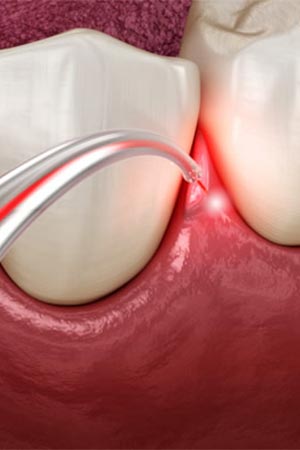Locations
Madhapur Plot No, 172, Rd Number 9, Ayyappa Society, Chanda Naik Nagar, Madhapur, Hyderabad, Telangana - 500072 Gayatri Nagar Plot no 298, beside sbi bank, Gayatri Nagar, Allapur, Borabanda, Hyderabad, Telangana - 500018 Miyapur H.no 1-258, opposite IndusInd bank, miyapur X Road, Miyapur, Hyderabad - 500049 Madhapur H.no: 2-56/23/15/5, ground floor, sainagar,madhapur, Hyderabad - 500081Laser surgery for teeth, is also called as laser dentistry or laser dental treatment, is a dental procedure that uses lasers to perform various treatments and surgeries on the teeth and oral tissues. Dental lasers emit focused beams of light that can interact with the tissues in the mouth, allowing for precise and targeted treatment. The use of lasers in dentistry has gained popularity over the years because of its benefits, like decreased pain, minimal bleeding, and quicker recovery times.
Who is eligible for the treatment?
Individuals, who need to treat pain from canker or cold sore, root canal infections or gum disease, are eligible for treatment. An individual also becomes eligible if he/she needs to reshape his/her gum, to eliminate throat tissues that influences sleep apnea, to regenerate damaged nerves and also if the individual wants to go through some other dental procedures. There are some important advantages of laser dentistry that makes it a better choice in comparison with traditional dental procedures.
What to expect during a laser treatment?
The initial step is to schedule an appointment with dentist. When the dentist has identified the issue you are experiencing and recommend laser treatment, here are a some of the things that usually happen during the procedure:
- Like a tooth filling procedure, laser treatments are also quite simple.
- There is no drilling in the teeth as the laser does all the work.
- The laser does not produce any pain or discomfort for the patient.
- You could bleed during the procedure, which will be immediately taken care by the dentist.

What to expect after a laser treatment?
Once you have gone through laser treatment, here are things that you can generally expect to happen:
In contrast to the severe bleeding that happens after a traditional dental procedure, laser treatments result in quite less bleeding. The region of treatment will neither be bleeding continuously nor will you have an open wound.
- Compared with other dental treatments, the possibilities of getting an infection are generally lesser with laser treatment.
- If the treatment worked out positively, there is minimal to zero probability of you having any pain or swelling.
- If you do have severe swelling or pain in your mouth and it doesn't go away in a day, don’t wait any longer and meet with your dentist immediately.
Applications of laser surgery
There are some common applications of laser surgery in dentistry:s
- Gum disease treatment: Laser surgery can target and eliminate infected gum tissue, promoting gum reattachment and decreasing the size of periodontal pockets. It can also be used to disinfect the gum pockets during periodontal treatments.
- Gum contouring: Dental lasers can reshape and contour the gum line, improving the appearance of gummy smiles or uneven gum lines.
- Tooth decay treatment: Dental lasers can be used to remove decayed areas of a tooth and prepare the tooth for a filling. This method is often less invasive and more comfortable for patients compared to traditional dental drills.
- Biopsy: Dental laser can be used to perform a biopsy when there are suspicious oral lesions or growths, which involves removing a small piece of tissue for further examination.
- Teeth whitening: Laser-assisted teeth whitening can enhance the effects of teeth whitening agents, leading to brighter smiles.
- Root canal treatment: Lasers can help clean and disinfect the root canals during root canal therapy, which can aid in better sterilization and potentially improve treatment success.
